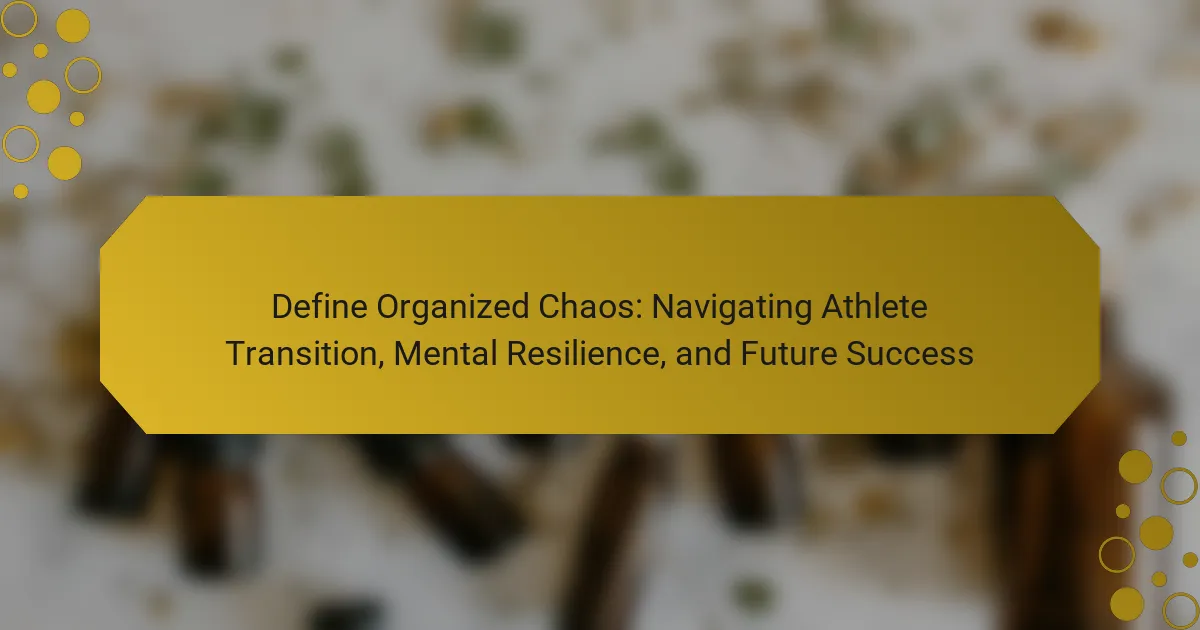Navigating the complexities of athlete transition requires mental resilience and adaptability. Organised chaos fosters these essential skills, enabling athletes to handle uncertainty and enhance problem-solving abilities. Embracing this concept leads to improved performance under pressure and greater achievements in future pursuits. This article explores the role of organised chaos in athlete transitions, its impact on mental resilience, and the path to future success.

What is the significance of organised chaos in athlete transition?
Organised chaos plays a crucial role in athlete transition by fostering mental resilience and adaptability. This concept allows athletes to navigate uncertainty and change effectively, enhancing their ability to cope with new challenges. Embracing organised chaos cultivates skills such as problem-solving and flexibility, essential for future success. Athletes who thrive in chaotic environments often demonstrate improved performance in high-pressure situations, translating their experiences into greater achievements post-transition.
How does mental resilience play a role in post-career planning?
Mental resilience is crucial in post-career planning as it enables athletes to adapt, overcome challenges, and pursue new goals. This psychological strength helps them navigate identity shifts and emotional hurdles after leaving competitive sports. Resilient individuals are more likely to engage in proactive career exploration and develop coping strategies for stress and uncertainty. Studies indicate that athletes with higher mental resilience report greater satisfaction and success in their post-career endeavours. This unique attribute fosters a mindset that embraces change, ultimately leading to enhanced future success.
What are the key components of mental resilience for athletes?
Mental resilience for athletes includes adaptability, focus, emotional regulation, and a growth mindset. These components enable athletes to navigate challenges and maintain performance under pressure. Adaptability allows athletes to adjust strategies in response to changing circumstances. Focus helps them concentrate on tasks, minimising distractions. Emotional regulation is crucial for managing stress and anxiety during competitions. A growth mindset encourages continuous learning and improvement, fostering resilience in the face of setbacks.
What challenges do athletes face during the transition period?
Athletes face numerous challenges during the transition period, including identity loss, mental health issues, and uncertainty about future opportunities. Identity loss occurs as athletes move away from their defined roles, leading to feelings of confusion and lack of purpose. Mental health issues, such as anxiety and depression, can arise due to pressure to succeed in new endeavours. Uncertainty about future opportunities often causes stress, as athletes navigate new career paths or roles outside of sports. These challenges require resilience and adaptability for successful navigation.
How can athletes identify their post-career goals?
Athletes can identify their post-career goals by reflecting on their passions, skills, and experiences. They should engage in self-assessment to recognise interests outside of sports, seek mentorship for guidance, and explore educational opportunities to build new competencies. Setting specific, measurable, achievable, relevant, and time-bound (SMART) goals can provide clarity and direction for their transition. Networking within their desired fields can also open doors to potential career paths.
What universal strategies can support a successful transition?
To support a successful transition, athletes should focus on mental resilience, adaptability, and continuous learning. Establishing a structured routine enhances stability during change. Engaging with mentors provides guidance and perspective. Setting achievable goals fosters motivation and direction. Emphasising self-care practices promotes overall well-being, crucial for navigating challenges effectively.
What are common coping mechanisms for managing stress?
Common coping mechanisms for managing stress include exercise, mindfulness practices, social support, and time management. These strategies enhance mental resilience, aiding athletes in transitioning and achieving future success. Regular physical activity reduces anxiety and improves mood. Mindfulness techniques, such as meditation, promote focus and emotional regulation. Building a support network fosters connection and shared experiences. Effective time management minimises overwhelm and enhances productivity.
How do unique attributes of an athlete’s career influence their transition?
Unique attributes of an athlete’s career significantly shape their transition by influencing their mental resilience and adaptability. Factors such as the length of their career, types of sports played, and personal achievements contribute to their readiness for change. For instance, athletes with diverse experiences often exhibit greater flexibility in navigating new challenges. Additionally, support systems and prior coping strategies play a crucial role in determining their success post-career. Understanding these unique attributes enables tailored transition programmes that enhance mental resilience and promote future success.
What role does personal branding play in post-career success?
Personal branding significantly influences post-career success by enhancing visibility and marketability. Athletes who effectively cultivate their personal brand can leverage their reputation to secure opportunities in business, media, and community engagement. This unique attribute of personal branding allows former athletes to transition smoothly into new roles, ensuring a sustainable and fulfilling career after sports. Additionally, a strong personal brand fosters mental resilience, enabling athletes to navigate challenges and maintain a positive public image.
What rare attributes can enhance an athlete’s post-career journey?
Rare attributes that can enhance an athlete’s post-career journey include adaptability, mentorship, and emotional intelligence. Adaptability allows athletes to navigate new challenges and environments effectively. Mentorship enables them to guide younger athletes, fostering community and legacy. Emotional intelligence helps in managing relationships and stress, crucial for a successful transition. These attributes facilitate resilience and open pathways for future opportunities.
How can mentorship impact an athlete’s transition experience?
Mentorship significantly enhances an athlete’s transition experience by providing guidance, emotional support, and practical advice. A mentor helps athletes navigate the challenges of shifting from competitive sports to new life stages. This relationship fosters mental resilience, crucial for adapting to changes. Studies show that athletes with mentors report higher satisfaction and greater success in post-sport careers. Mentorship also cultivates unique attributes, such as networking skills and self-confidence, which are vital for future success.
What resources are available for athletes navigating this transition?
Athletes navigating transitions can access various resources, including mentorship programmes, mental health services, and workshops. These resources focus on building mental resilience and preparing for future success.
1. Mentorship Programmes: Pair athletes with experienced professionals for guidance.
2. Mental Health Services: Offer counselling and support tailored to athletes’ unique challenges.
3. Workshops: Provide training on skills like goal setting and stress management.
4. Online Communities: Foster peer support and shared experiences among transitioning athletes.
5. Educational Resources: Include books, podcasts, and articles focused on athlete transition.
What are the benefits of professional counselling for athletes?
Professional counselling provides essential benefits for athletes, enhancing mental resilience and facilitating smoother transitions. It offers emotional support, helping athletes cope with stress and performance pressure. Counselling also promotes self-awareness, enabling athletes to identify personal strengths and weaknesses. Additionally, it fosters goal-setting skills, guiding athletes towards future success in sports and life.
What are the best practices for maintaining mental health after retirement?
Maintaining mental health after retirement involves structured activities, social connections, and self-care practices. Engaging in regular exercise, pursuing hobbies, and volunteering can enhance well-being. Social interactions help combat isolation, while mindfulness and therapy can provide emotional support. Setting goals fosters a sense of purpose.
What common mistakes should athletes avoid during their transition?
Athletes should avoid common mistakes like neglecting mental health, failing to establish a routine, and underestimating the importance of support systems. Transitioning can disrupt an athlete’s identity, leading to anxiety. Establishing a structured daily schedule can enhance mental resilience. Seeking guidance from coaches and peers fosters a supportive environment, significantly impacting future success.
How can athletes create a sustainable post-career plan?
Athletes can create a sustainable post-career plan by focusing on mental resilience, networking, and skill development. Establishing a clear vision for life after sports is crucial. Transitioning athletes should identify transferable skills, engage in continuous learning, and build professional relationships within and outside their sport.
Developing a support system is essential for navigating this transition. Engaging with mentors and peers can provide guidance and encouragement. Additionally, athletes should consider their financial planning, exploring investment opportunities and career options that align with their passions and strengths.
Setting short- and long-term goals will help maintain focus and motivation. Regularly assessing progress and adapting plans ensures relevance in a changing job market. By prioritising these strategies, athletes can achieve a successful and fulfilling post-career life.
What steps can be taken to build a supportive network?
Building a supportive network involves intentional steps to foster connections. Start by identifying individuals who share similar goals and values. Engage in community events or workshops to expand your circle. Utilise social media platforms to connect with like-minded individuals. Offer support to others, creating a reciprocal relationship. Regularly communicate and check in with your network to maintain strong ties.
What insights can experts provide on athlete mental health and transition?
Experts emphasise the importance of mental resilience during athlete transitions to ensure future success. They highlight strategies to cope with identity shifts, stress management, and building support networks. Research indicates that athletes who develop mental resilience are more likely to thrive post-career. Transition programmes that include psychological support have shown a significant impact on overall well-being.
